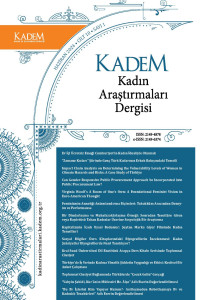“Bu Ev İşlerini Kim Yapıyor Kuzum?- Asrileşmeden Robotlaşmaya Ev ve Kadınlık Tezahürleri” Adlı Eserin Değerlendirilmesi
Abstract
Bu çalışmada, Leyla Bektaş Ata, Defne Karaosmanoğlu ve Bahar Emgin tarafından yazılan Bu Ev İşlerini Kim Yapıyor Kuzum?- Asrileşmeden Robotlaşmaya Ev ve Kadınlık Tezahürleri kitabının değerlendirilmesi yapılmaktadır. Yazarların TÜBİTAK 1001 Destekli “Türkiye’de Elektrikli Ev Teknolojilerinin Toplumsal Tarihi (1930-2020): Kadınların Gündelik Hayatlarında Modernleşme” adlı 2 yıl süren araştırma projesinin kitaba dönüşmüş hâlidir. Yazarların arşiv verilerinden, Türkiye’deki ev işlerine bağlı teknolojik aygıtların kullanımı ve temsili ile mekânsal olarak evi, evdeki rolleri, ev içinde yer alan kişilerarası dinamikleri değiştirme ve dönüştürme özelliğine vurgu yaparak, kadının sosyal, kültürel, politik ve teknolojik değişimlerin temsil ediliş biçimi, kamusal ve özel, modern ve geleneksel gibi ayrımları nasıl bozduğunu veya tekrar ürettiğini anlamaya çalışan, sosyal, kültürel, politik ve teknolojik aygıtlar üzerinden toplumsal cinsiyet yönüne vurgu yaparak değişimlere odaklanan bütüncül bir tarih yazımı ortaya koymuşlardır. Kadının temsilî olarak asli vazifelerinin hâkim devlet bakışına yönelik açıklamaların yıllara göre değişiklik gösterdiği ve kadın imgesinin, algısının dönüştüğünü tarihsel olarak gözler önüne serilmesi bağlamında nesnelliğiyle alana katkı sunan bir kaynak özelliği taşımaktadır.
References
- Bektaş Ata L, Karaosmanoğlu D., Emgin B. (2023), Bu Ev İşlerini Kim Yapıyor Kuzum? Asrileşmeden Robotlaşmaya Ev ve Kadınlık Tezahürleri, İdeal Yayıncılık.
A Review of “Who’s Responsible for the Household Chores, My Dear?: The Manifestations of Home and Femininity from Modernization to Robotization”
Abstract
This study evaluates Leyla Bektaş Ata, Defne Karaosmanoğlu, and Bahar Emgin’s book Who is Responsible for the household chores, my dear?. Before the advent of modernization, the division of labor was transforming, with an increasing tendency towards automation and feminization. The authors’ TÜBİTAK 1001-supported publication, ‘Social History of Electrical Home Technologies in Türkiye (1930-2020): Modernisation in Women’s Everyday Lives’, constitutes the book version of a two-year research project. The authors have produced a holistic historiography based on archival data, which focuses on the use and representation of technological devices related to housework in Türkiye. This analysis emphasizes the ability of these devices to spatially change and transform the home, the roles within the home, and interpersonal dynamics within the home. The goal is to comprehend how social, cultural, political, and technological changes disrupt or reproduce distinctions, such as the representation of women, the delineation between public and private spheres, the juxtaposition of modern and traditional values, and the impact of gender-specific factors through social, cultural, political, and technological devices. The source provides a valuable contribution to the field, offering an objective perspective on the historical evolution of the dominant state view of women’s primary duties, which has shifted over time. This shift has also transformed the image and perception of women.
Keywords
References
- Bektaş Ata L, Karaosmanoğlu D., Emgin B. (2023), Bu Ev İşlerini Kim Yapıyor Kuzum? Asrileşmeden Robotlaşmaya Ev ve Kadınlık Tezahürleri, İdeal Yayıncılık.
Details
| Primary Language | Turkish |
|---|---|
| Subjects | Women's Studies |
| Journal Section | Book Reviews |
| Authors | |
| Publication Date | June 28, 2024 |
| Submission Date | May 15, 2024 |
| Acceptance Date | June 22, 2024 |
| Published in Issue | Year 2024 Volume: 10 Issue: 1 |


